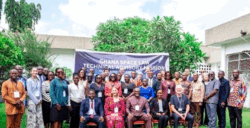By Ebenezer Chike Adjei NJOKU
The Bank of Ghana (BoG) Governor, Dr. Ernest Addison, believes the foundation for a resilient banking industry in the country has been firmly established, thus priming it for the future.
According to him, credible measures have been implemented to safeguard the broader financial sector – and banks especially – from historical and emerging risks, even as the global and local financial sector dynamics continue to evolve.
Speaking at the 28th Annual National Banking and Ethics Conference organised by the Chartered Institute of Bankers (CIB) Ghana, under the theme ‘Resilience in the Financial Services Sector and Ecosystem: Navigating Horizon Risk’, Dr. Addison stated that broad and sustained stakeholder vigilance is required to maintain the momentum.
“The rising risks – such as technological disruptions, climate-related vulnerabilities and economic shifts – are realities that require strategic foresight and proactive regulation,” he added.
The banking sector has demonstrated steady signs of recovery, with assets growing by 38.7 percent at the end of August 2024 compared to 19.6 percent in the same period last year, according to the latest official figures.
Pre-tax and after-tax profits for the first eight months of 2024 also surpassed figures from the corresponding period in 2023.
In terms of solvency, the industry’s Capital Adequacy Ratio (CAR) rose to 10.3 percent in August 2024; up from 7.5 percent in August 2023. Including relief measures, CAR stood at 13.8 percent – slightly lower than the 14.2 percent recorded in August 2023. Additionally, liquidity and efficiency ratios showed improvements during the year’s first eight months.
The Governor highlighted BoG initiatives aimed at reinforcing sector resilience, including reforms to strengthen risk management, corporate governance and capital adequacy.
He noted: “The Bank has prioritised climate and sustainability-related issues, including time and resources, to promote sustainable banking principles among regulated financial institutions”.
In response to the threats posed by technological innovations such as artificial intelligence and blockchain, BoG launched the Financial Industry Command Security Operations Centre to enhance cybersecurity resilience.
Addressing challenges
President-CIB Ghana Benjamin Amenumey expressed concern about issues including credit risk, financial fraud and macroeconomic pressures – describing them as key challenges and noting lingering effects of the recent Domestic Debt Exchange Programme (DDEP).
“Over the past few years, our sector has faced a series of unprecedented challenges,” Mr. Amenumey stated while stressing the need for forward-looking management strategies.
He described the rising level of non-performing loans (NPLs) as a major concern, saying: “Persistent economic pressures have strained businesses and households, impacting their ability to service loans”.
Despite the aforementioned industry-wide improvements, the NPL ratio was 24.3 percent in August 2024 – up from 20 percent in August 2023 as defaults, especially from large borrowers, increased; highlighting that elevated credit risk remains the primary concern for the sector’s outlook.
Financial fraud is also on the rise with a 5 percent increase in fraud cases, notably an alarming 46 percent rise of staff involvement in fraudulent activities, according to the most recent BoG fraud report.
The CIB Ghana president advocated stronger internal controls, ethical training and enhanced corporate governance as part of the solution.
Macroeconomic volatility, including regional pressures and asset depreciation, continues to heighten operational costs. Mr. Amenumey added: “Cybersecurity threats and the rapid digitalisation of banking services present vulnerabilities that demand ongoing investment”.
Industry collaboration
President-Ghana Association of Banks (GAB) and Chief Executive Officer-GCB Bank, Kofi Adomakoh, called for a collective response to these challenges. “How do we deal with the threats of cyber-security? How do we contain the challenges with disruption of the operating models of banks and fintechs, tech giants and AI?” he queried.
Mr. Adomakoh praised the initiatives spearheaded by CIB Ghana, including the ethics and ESG certification programmes, which he said are “equipping bankers with the skills and knowledge needed for the future.” However, he encouraged the institute to go further by introducing certifications in digital innovation, artificial intelligence, and data analytics.
GAB President Adomakoh also raised concerns about the exodus of talent from Ghana’s banking sector. “How will we continue to invest skills in bankers to make them relevant?” he asked, urging stakeholders to adapt swiftly in the rapidly changing financial landscape.
Despite these challenges Adomakoh remained optimistic, describing the Ghanaian banking sector as resilient. “Our banks are stronger and well-positioned to fulfil their mandate by providing innovative solutions that meet the evolving needs of our clients and contribute meaningfully to the nation’s economic development,” he said.
Ethics
Both the BoG and GAB stressed the importance of ethical practices in achieving resilience. Dr. Addison emphasised that “ethical certification should not be optional but a standard across the industry”. He called on all banks to enrol their staff in the Ethics Certification Programme, describing it as an essential tool for ensuring professionalism at all levels of the banking sector.
Mr. Adomakoh echoed this sentiment, stating: “Our sponsorship of this conference aligns with our belief in the transformative power of education, thought leadership and capacity building”.
He underscored the need for a culture of ethics and professionalism across the sector to inspire public trust.
There was a strong call for deeper collaboration among regulators, financial institutions and stakeholders to build a robust financial system capable of weathering future challenges.
Mr. Amenumey urged participants to embrace risks as a necessary component of resilience. “Resilience is not built by avoiding risks but by participating in them, adapting and seizing opportunities,” he said.










